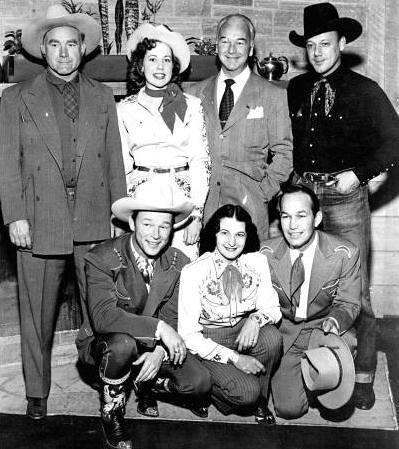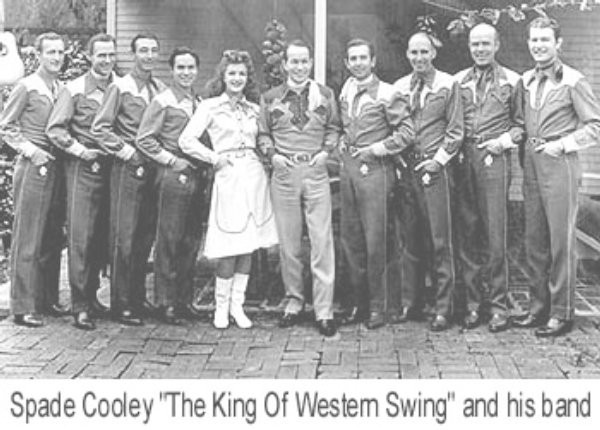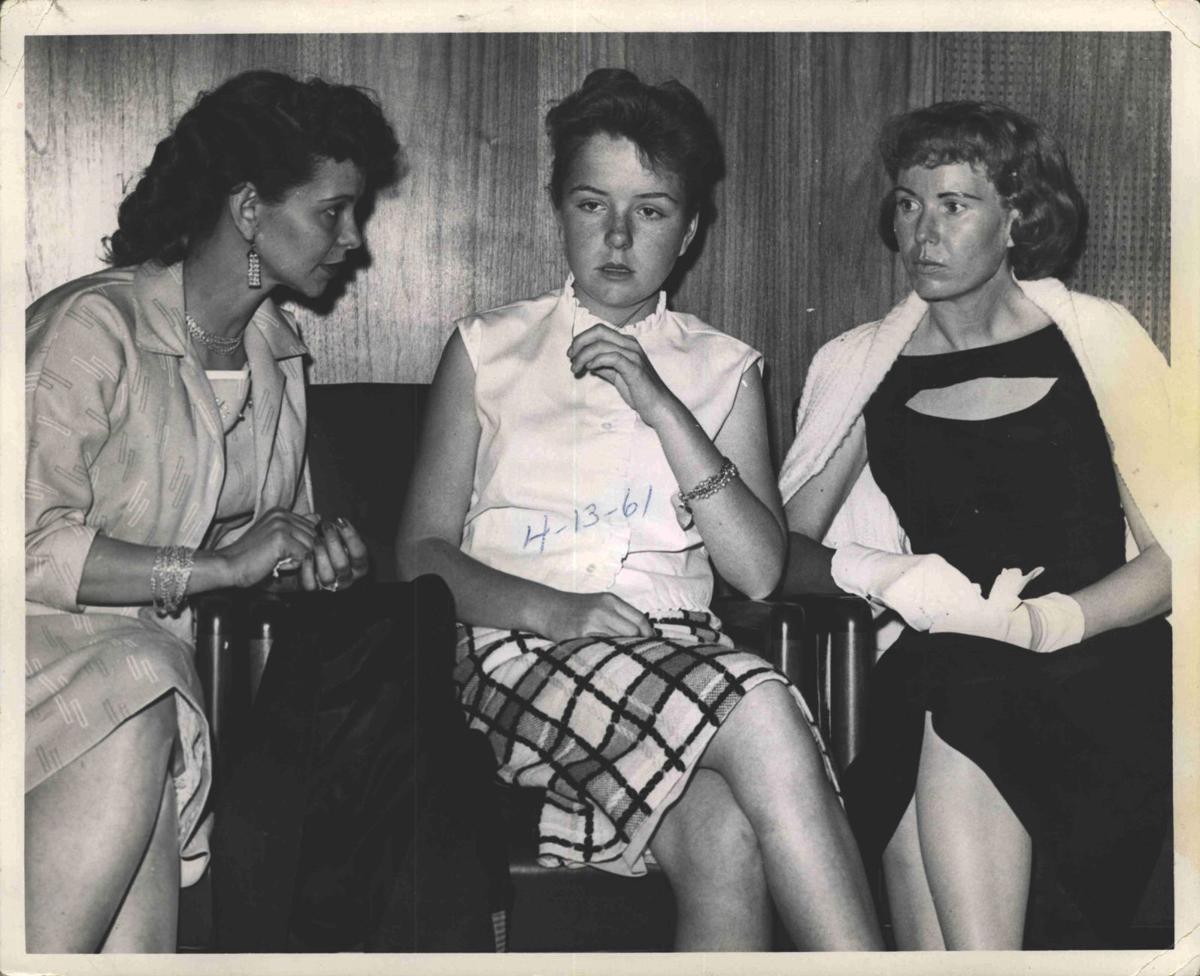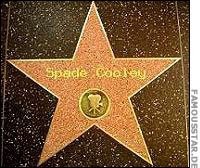He says murder, he says, every time we kissHe says murder, he says, at a time like thisHe says murder, he says, is that the language of love?
Listen to the story Spade Cooley with Roy Rogers (both kneeling)
Spade Cooley with Roy Rogers (both kneeling)
By the 1930s, Spade was in Los Angeles and playing hot enough on the fiddle that he was picking up regular gigs with the country-western bands working the L.A. circuit. One of those bands was the Sons of the Pioneers, whose most famous alumnus, Roy Rogers, had moved on to a movie career as singing cowboy at Republic Pictures.
Someone introduced Cooley to Rogers, and they quickly became fast friends. Spade also bore a slight resemblance to Roy ? both had the same build and same moon face ? and soon Cooley was pulling down an extra $17 bucks a week as Rogers stand-in and stunt double, as well as working in Rogers? back-up band, The Riders of the Purple Sage, as fiddle player and vocalist. Between those jobs and his other gigs around town, Spade was pulling down a pretty good living. Fame and fortune were right on the horizon.
The lightning bolt came in the form of Bob Wills and His Texas Playboys, whose arrival in L.A. in the early `40s kicked off a cowboy music craze in the city equivalent to the Beatles invasion of America some 20-odd years later. The Okies from the Dust Bowl were still in town and soldier boys from the Midwest and the West were flowing into the area?s military bases. All of them had money in their pockets, and all of them wanted to dance the dances they knew from back home, and listen to that ol?-time music with a new, hot swing beat.
Spade was working in a trio at Santa Monica?s Venice Pier Ballroom when the cowboy swing music craze hit. The manager thought Cooley had what it took to lead a house band that could capitalize on the new craze, and fronted Spade the money to put together an act. Spade Cooley and His Orchestra would end up drawing in thousands every Saturday night during an 18-month run, making Spade the ?King of Western Swing? and eventually landing him into the movies.
After leaving the Venice Pier, Spade put together one of the hottest touring western swing bands in America, including everything from a harpist to an accordionist along with the more usual guitars and fiddles. At one time Cooley?s accordionist was Milton DeLugg, who, would later become the co-author of the song, Orange Colored Sky, as well as the leader of The Gong Show?s house band.
The Spade Cooley Orchestra typically included more than a dozen musicians and a girl singer ? all dressed in flashy cowboy getups. Even though most of the members came from places like Milwaukee, Boston, and Brooklyn, Spade hung a western moniker on every one of them: Smokey Rogers; the apparently Irish-Mexican Joaquin Murphy; Cactus Soldi; and yodelin? blonde bombshell, Carolina Cotton, who had been born with the more mundane name of Helen Hagstrom.
Spade was now heading into the peak of his career, cutting his first recorded hit, Shame, Shame, On You, which would become his theme song, headlining at the Santa Monica ballroom, and playing sold-out shows up and down the West Coast. In fact Spade Cooley and His Orchestra were so popular that they couldn?t meet all their bookings. There were rumors Spade had two or three bands on the road simultaneously, all operating under the Spade Cooley name, some even fronted by pseudo-Spades when the rubes were hick enough for them to get away with it. One story has Spade opening with His Orchestra at one gig, then hopping into a taxi for a quick ride across town to do a couple of numbers with another Spade Cooley Orchestra while the first band continued on Spadeless.
Spade had it all by the late 1940s. An estate in a classy section of Los Angeles, a ranch in the Mojave Desert, and a 56-foot yacht. One hundred custom cowboy suits, 50 hats, and three dozen pairs of boots. A string of B-movies. A hit television show with a 75 percent audience share. A reported $15 million fortune.
 Spade Cooley and His Orchestra. Ella Mae Evans is standing next to Spade.
Spade Cooley and His Orchestra. Ella Mae Evans is standing next to Spade.
But the string of straight flushes was just about over. Spade had a hot temper, liked to drive his band hard, and had a taste for both booze and ladies who weren?t his wife. In 19 and 45, singer Carolina Cotton had split, forming her own band with ex-Cooley sideman, Deuce Spriggens. Cooley replaced Carolina with Ella Mae Evans, a 21-year-old clarinet player who, from all reports, couldn?t sing worth a damn. But hey, she was blonde, cute as a bug, and Spade had the hots for her ? the last by itself good enough reason for Ella Mae to get the job. But she wouldn?t have it for long.
Spade soon divorced his wife, did the right thing by Ella Mae and married her, and quickly had her knocked up. And being the good ol? Okie boy that he was, Spade preferred his wife at home, cooking biscuits and taking care of the young?uns. Spade also decided that city life was no place for Ella Mae and his new brood, so he bought a spread at the edge of the Mojave Desert and installed his growing family there. Spade kept the L.A. mansion, leaving Ella Mae alone in the Mojave, sadly serenading the coyotes and prairie dogs with clarinet solos while waiting for the occasional visit from the King of Western Swing.
All was not well in the King?s kingdom. In the early 1950s, Spade had his first heart attack, perhaps caused by the realization that the western swing dance craze was evaporating as quickly as it had appeared. In close order, Cooley?s record contract expired and wasn?t renewed, his movie career dried up, his television show went off the air, and the crowds started to fade away at Cooley?s house gig. Spade talked his way into a new TV show, but his drinking and temper had gotten out of hand by this point, and he was soon fired. Spade cut his final record in 1959, and maybe he saw the handwriting on the wall, as the B-side of his last single was a half-hearted attempt at a rock-?n-roll number.
At loose ends, only in his fifties, and needing hard cash to keep him, his girlfriends and the Mojave Desert contingent in the style that they were all accustomed to, Spade came up with several bizarro money-making schemes. He fired the Spade Cooley Orchestra in one wholesale massacre, replacing them with an all-girl novelty band. Of course, Spade may have also looked at this as a convenient source of poontang since he wasted no time in taking on one of the new band members as his lover. Unfortunately, the Spade Cooley All-Girl Orchestra proved not to be a popular success, and Cooley soon was searching for some other way to bring much-needed ducats into the Kingdom.
Speaking of Kingdoms, The Magic Kingdom, Disneyland, had opened in 19 and 55 and by the `60s was a moneymaker for Uncle Walt. Spade hit upon the idea of Water Wonderland, a water theme park based in the same area as his Mojave Desert ranch, and catering to the L.A. family willing to take a 50-mile auto trip out to an oasis in the desert. Cooley bought up another 50 acres around his ranch, acquired some business partners, and started on the development of Water Wonderland.
It wasn?t a bad idea, and it might have even worked. But Spade wasn?t destined for four straight flushes in a row. His string had finally run out.
By the early `60s, Spade?s mental health was noticeably fragile, with one friend later saying that Cooley would have been on heavy-duty anti-depressants if he had been living in our more medicated times. His condition wasn?t helped by the fact that Cooley was insanely jealous when it came to Ella Mae, convinced her life was one round of sex orgies after another out there in the Mojave. Of course this probably had something to do with the fact that Spade Cooley had been stepping out on Ella Mae since the day they were married, and the story went that ol? Spade wasn?t shy about taking on multiple sex partners himself when opportunity arose.
With no more evidence than two of his new business partners had some effeminate mannerisms ? they were, in fact, gay, an investigator discovered many years later ? and that they had befriended Ella Mae on one of their trips to Cooley?s ranch, Spade came to the conclusion that they had recruited his wife into what he?d later describe as a ?free-love sex cult.? This was, after all, the very early `60s, and a man of Cooley?s generation might be confused about the radical differences between homosexuality, free-love, and sex cults. All Spade knew was that he was certain that they were putting the pork to his sweet lil? Ella Mae, and This Could Not Stand.
Tiring of being spied upon and of enduring all-night accusations of her infidelities, Ella Mae filed for divorce. Spade counter-filed, but then changed his mind, and asked Ella Mae to take him back. Ella Mae took to the hospital instead, where she reportedly informed a nurse who befriended her that the only affair she had ever had was with Spade?s one-time mentor and friend, Roy Rogers, and that fling was long over.

Even though Spade had dropped his divorce proceedings, he hired a private detective to ?check up? on his wife, as Cooley put it, after Ella Mae was released. The P.I. didn?t have to work at it too hard. In a few weeks, Spade called him, said his wife was now ready to admit her affairs, and put Ella Mae on the line. Ella Mae stated that she had one 30-minute quickie with a man at a local motel, providing both a date and the motel?s location, but refusing to give her supposed paramour?s name. She closed the conversation with the statement that she?d love Spade ?until the day I die.?
That would be the next day.
 Fourteen-year-old Melody Cooley, center
Fourteen-year-old Melody Cooley, center
Spade showed up at an afternoon meeting on Water Wonderland drunk and angry, stormed out, and went home to the Mojave Desert estate. What happened then only Spade and Ella Mae would ever know. Their 14-year-old daughter Melody walked in at 6:20 p.m. Spade, who had blood spots on his pants, took Melody by the arm and said, ?Come here, your mother?s going to tell you something.?
He walked his daughter to a bathroom shower where the water was running. Ella Mae lay on the shower floor, already unconscious, possibly already dead. Spade hauled her out by the hair and began kicking and beating the body, using a cigarette to burn it, all in front of Melody, who eventually escaped when Cooley was distracted by a phone call. Spade apparently spent the next four hours alone with Ella Mae?s body. His manager, nurse Dorothy Davis, the one who claimed Ella Mae had confessed an affair with Roy Rogers to her, and Spade?s grown son and daughter-in-law all arrived at the Cooley estate around 11 p.m., eventually convincing Spade to call for an ambulance. But it was much too late.
Ella Mae Cooley had died from a ruptured aorta, a result of Spade?s punching and kicking. He claimed to investigators that Ella Mae had fallen in the shower, apparently repeatedly, but had no explanation as to why his hands were so swollen he couldn?t close them.
The Spade Cooley murder trial would be an early precursor to the L.A. celebrity murder trials of O.J. Simpson and Robert Blake, having all the dramatics, sex, and scandal of both those cases. Cooley would collapse in court during his daughter?s testimony. The investigator who Cooley had hired played the tape of Ella Mae?s so-called confession, noting that in a follow-up investigation that he could find no evidence that she had ever been at that motel or, indeed, that she had ever had an affair with anyone.
Nurse Dorothy Davis testified about Ella Mae?s claim that she had had a short-term fling with Roy Rogers years before. Davis noted that she had never believed the story, but had no theory about why Ella Mae would have lied. A spokesperson for Roy Rogers termed the story, ?ridiculous.?
A week into the trial, Cooley again collapsed when his five-year-old granddaughter greeted him with a sweet, ?Hi, Grandpa.? Finally, it was his turn to take the stand, possibly not the best of decisions from his legal team. On the other hand, Cooley had plead not guilty by reason of insanity, and his testimony didn?t do anything to cast much doubt on that claim.
Cooley said that on the day of her death Ella Mae had finally provided him with a lengthy laundry list of her sexual adventures. He said she had admitted her affair with Roy Rogers, who apparently had a weekly date with Ella Mae while Cooley was doing his Saturday night TV show.
And then there was the free-love sex cult, masterminded, Cooley said, by a bunch of the ?limp-wrist set? who were planning on destroying the values of America.
Ella Mae had fallen, Cooley related, in the shower. He had heard ?a horrible thud? and rushed into the bathroom to find Ella Mae unconscious. His daughter, Melody, had fantasized her story about Spade beating and burning Ella Mae because she was annoyed that Spade wouldn?t allow her to date.
And then there was that free-love sex cult, again. Midway through his account about Ella Mae?s accident, Cooley suddenly blurted out, ?Rockets ran through my brain when Ella Mae told me of her desire to join a free-love cult. I must have hurt her terrible.?
After a month-long trial and 19 hours of deliberation, the jury convicted Cooley of murder on August 19, 1961. Cooley withdrew his insanity plea, and the court sentenced him to life, sparing Spade a trip to the gas chamber because of his poor health.
Given that he was a convicted murderer, Spade got off relatively easy, sentenced to Vacaville State Prison, rather than the hard time San Quentin, where most California murderers end up. Cooley was a model prisoner, finally admitting in 1965 that he had done the crime and deserved the time. In 1969 Cooley supporters petitioned Governor Ronald Reagan to pardon or parole Spade. Reagan wouldn?t go for the pardon, but, maybe in solidarity with another B-movie actor, did use his influence to buy Spade a favorable decision with the parole board, which unanimously recommended parole for Cooley, effective February 22, 1970 ? Spade?s 60th birthday.
But a man who would name himself after three straight flushes in a row shouldn?t expect any more luck in this world. Four months before his release, Cooley was granted a furlough to do a benefit concert for the Alameda County Sheriff?s Department. Spade played three songs, was greeted by enthusiastic applause, and walked backstage. ?You know,? Cooley said, ?I wasn?t sure whether my fans would want me back, but I think it?s going to be okay.?
?I think it?s gonna work out for me,? he continued. ?I have the feeling that today is the first day of the rest of my life.?
He was right. And it was also the last day of his life. A minute later, Spade Cooley was dead of a massive heart attack at 59 years of age.
The Hollywood Chamber of Commerce keeps it a close secret about exactly how one ends up with a star on their Walk of Fame, although the record seems to show that up until about 10 years ago, anyone with five grand had a good chance of buying whoever they wanted a star, just as long as that person had some connection to the entertainment business.
 Spade Cooley?s star on the Hollywood Walk of Fame
Spade Cooley?s star on the Hollywood Walk of Fame
If you take a stroll down Hollywood Blvd. and stop at 6802, right next to Kevin Costner, you?ll find the name of one Spade Cooley, born Donnell Clyde Cooley, movie and television star, King of the Western Swing, and the only convicted murderer to have his own star on the Hollywood Walk of Fame.
Have a comment or question? Email me at [email protected]
Like this article? You might also like:
Oh Mercy: Bob Dylan, Chronicles, and the Mysterious Hand Injury
Bob Dylan & the Strange Journey of Warhol?s Silver Elvis
Dylan, Newport `65 & the Search for the Green Polka-Dot Shirt
All the Lies That Are My Life: Bob Dylan, Lorre Wyatt and ?Blowin? in the Wind?
Crawling from the Wreckage: Bob Dylan and his Motorpsycho Nitemare
Bob Dylan, Knocked Out Loaded, and the Daughters of Doom
Real Life or Something Like It: Bob Dylan and the Asia Series

